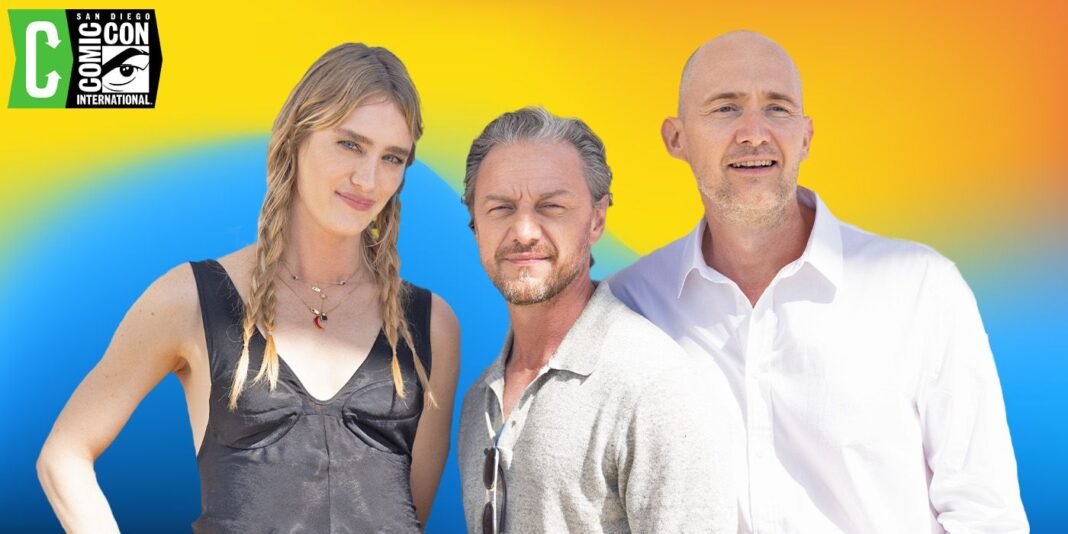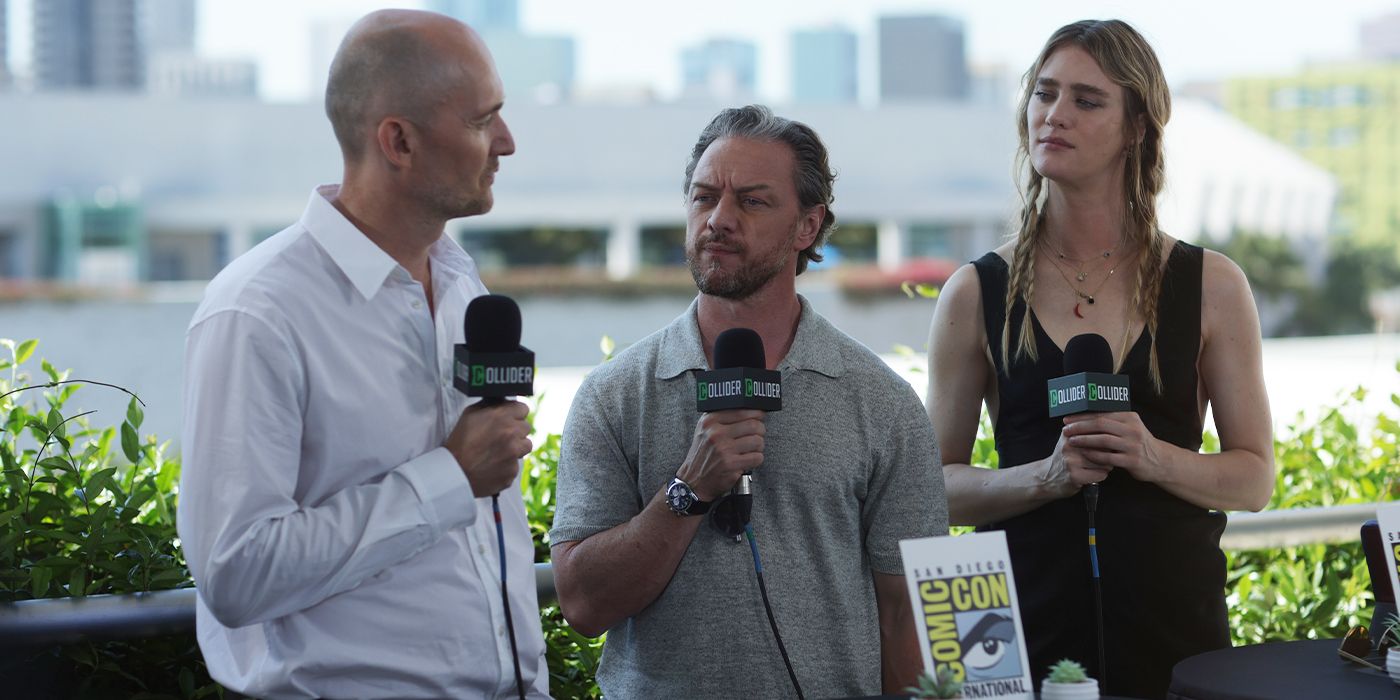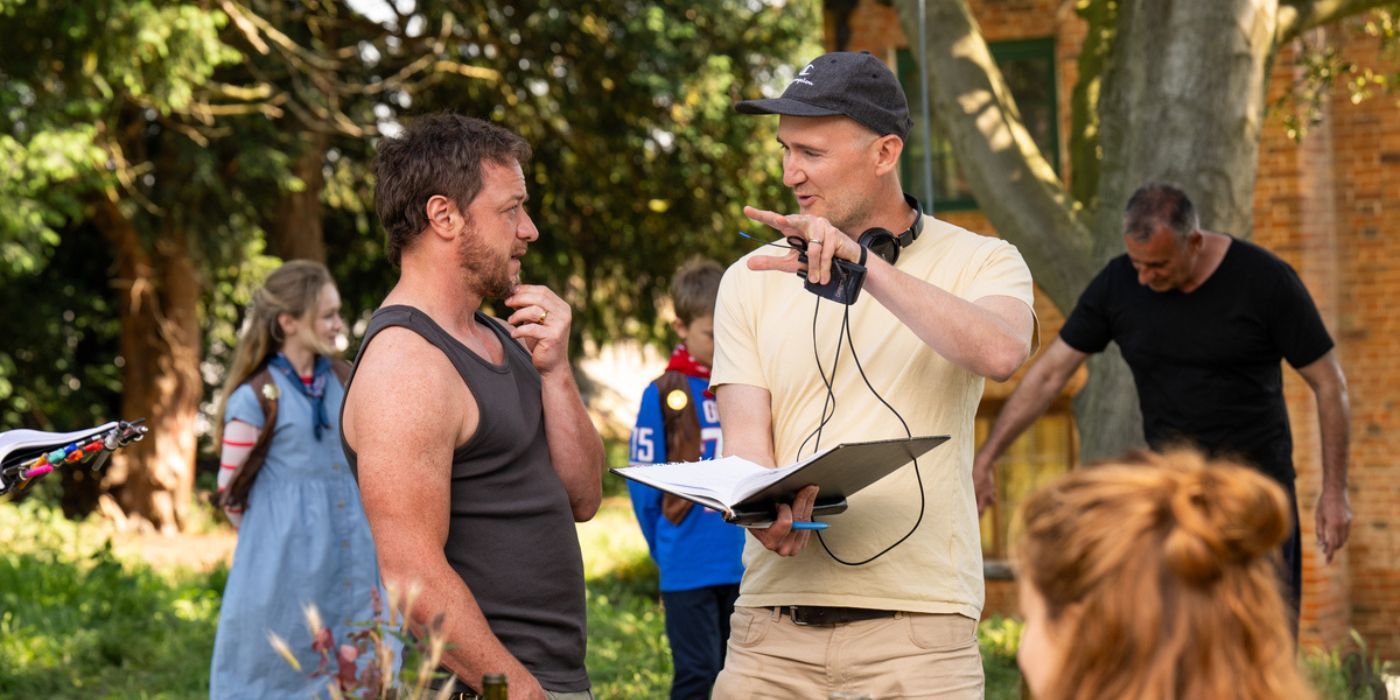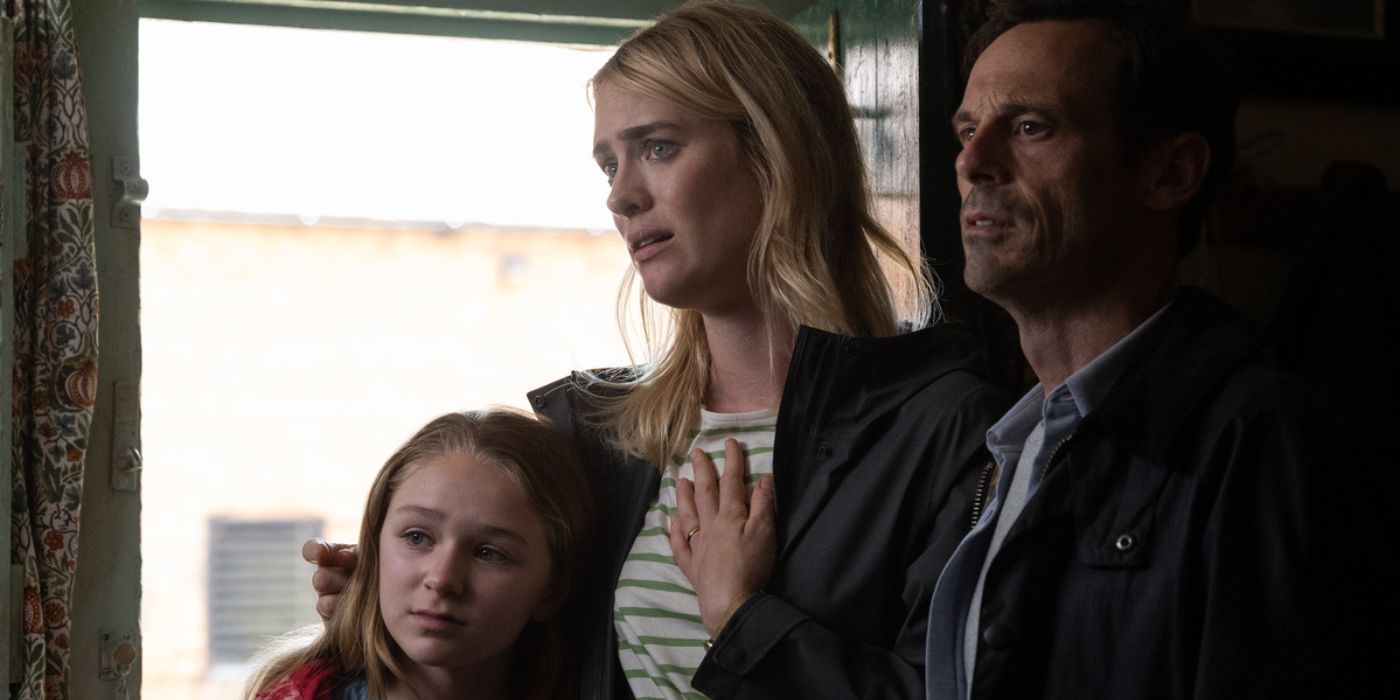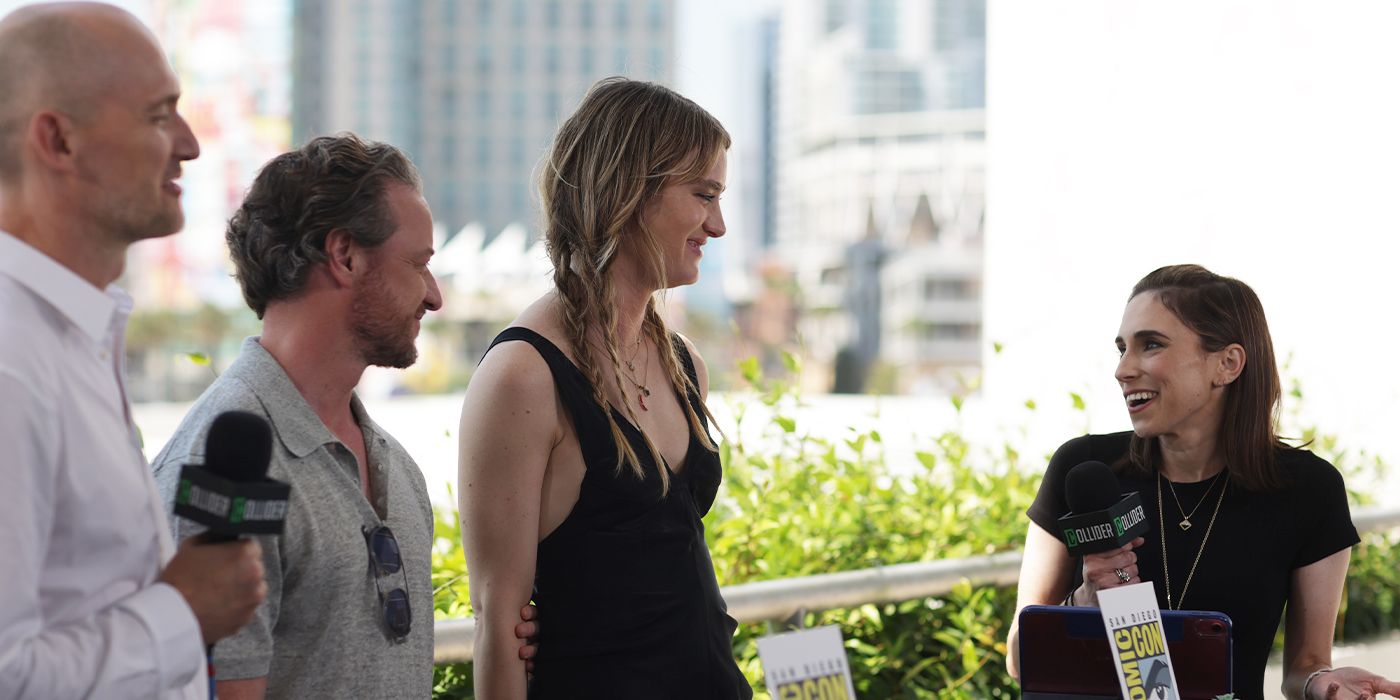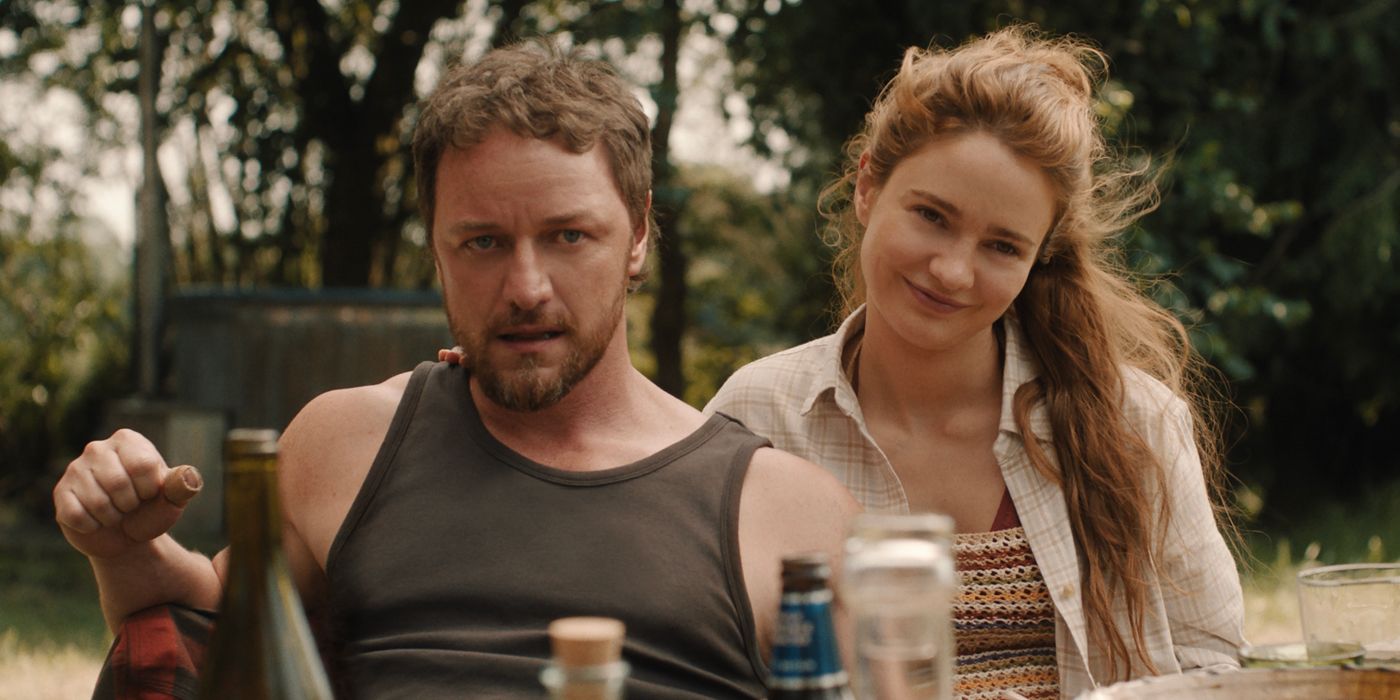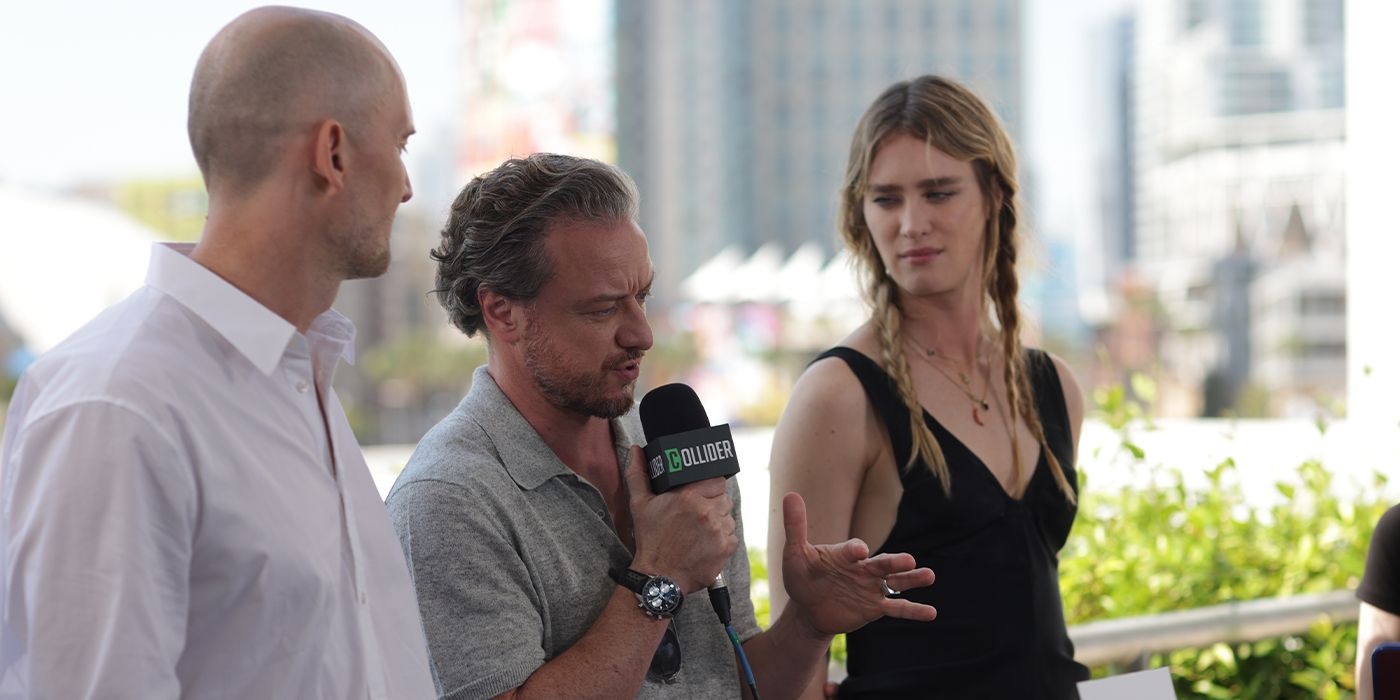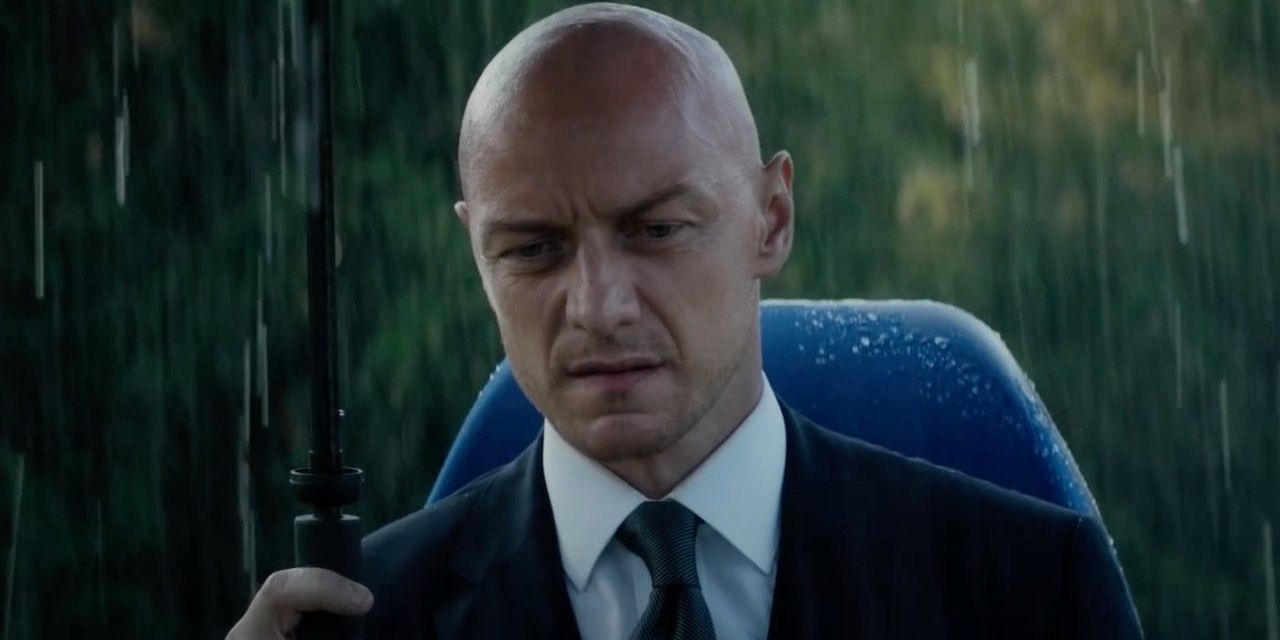The Big Picture
- Collider’s Perri Nemiroff chats with the writer-director and stars of the upcoming
Speak No Evil
remake at SDCC 2024. - James Watkins’
Speak No Evil
brings a new interpretation of the unforgettable Danish horror film to theaters nationwide in September. - Watkins, James McAvoy, and Mackenzie Davis tease third act surprises, discuss how their characters evolved from script to screen, weigh in on why it’s great to have both versions of the film, and more.
The horror genre is thriving in the United States, and worldwide. Hollywood remaking international horror films is nothing new, but writer-director James Watkins takes on an especially big challenge by putting his own spin on an iconic Danish horror film that hit theaters just two years ago, Speak No Evil.
While retaining the chills and complexities of the original film, Watkins, along with his stars, James McAvoy and Mackenzie Davis, infuse this new take on the story with human conflict and emotion that are bound to challenge moviegoers to wonder, how far would you let someone push you until you say, enough is enough? Released by Universal Pictures, Speak No Evil follows a London-based family invited to visit the country home of a couple they recently met on vacation. Little do they know, that much-needed getaway is bound to become a psychological nightmare.
At San Diego Comic-Con 2024, Collider’s Perri Nemiroff chatted with Watkins, McAvoy, and Davis about the upcoming film, releasing on September 13, the communal experience of watching movies, and McAvoy’s interest in seeing more Professor X on the big screen.
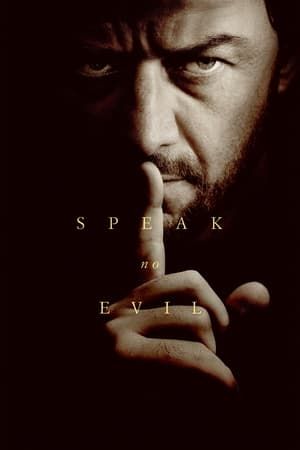
Speak No Evil (2024)
A family is invited to spend a weekend in an idyllic country house, unaware that their dream vacation will soon become a psychological nightmare.
- Release Date
- September 13, 2024
- Director
- James Watkins
PERRI NEMIROFF: James, it’s been a little while since you’ve directed a feature film, but I know you did a lot of series work. Is there anything about working in the series realm that you think influenced your feature-filmmaking for the better?
JAMES WATKINS: I’m quick! No, I think character, character, character is the lesson when you work in television. It’s bringing that through, but in more compression that you have in a film. With this, all our conversations were character. That’s what, for me, makes any film enjoyable — investing in the characters and going on their journeys, and seeing how they interact with each other.
Given the emphasis on character, I’ll go there next. James and Mackenzie, can you each name the quality of your character that you were most excited to sink your teeth into?
JAMES MCAVOY: Duality.
WATKINS: I was gonna say duality. That’s amazing.
MACKENZIE DAVIS: Singularity.
I’ll lean into duality first. James, what is the key to balancing the necessary charm that Paddy needs to have so that the audience wants to spend time with him while never losing that underlying horror that something bad could happen because of him?
MCAVOY: That’s all in dexterous, deftness, a lot of skill, and a lot of calibration and orchestration from James. That’s how you make it work, but the things you have to work with are this masculinity that he’s portraying that, on one side, can so easily be toxic and be chauvinist, and so easily be dominant and not okay, but then there is another side of it as well, which is society does also want you to be masculine, too. It doesn’t just want us all to get rid of that. You are going to walk into multiple situations in your life where you are asked to be “a man,” whatever the fuck that means — but it doesn’t mean those things, but it does mean those things. You’re kind of walking this line.
I think why it’s an interesting character to play is, yes, he is charismatic, yes, he is terrifying, but he is also both versions of masculinity. At times, it’s sort of attractive to even almost be the negative thing, to be the toxic thing. There are times when people almost want you to be that, and flirting with the line of how much do you want that, and when is it wrong to want that and all those things, it was fun to do with the audience.
Why Do They Stay in ‘Speak No Evil?’ Mackenzie Davis Explains
Mackenzie, Louise is basically the only one who recognizes something’s not quite right. What is the key to giving the audience the urge to be like, “No! Don’t stay there! Leave,” but also making it believable why she would make the decision to stick around a little longer?
DAVIS: I think it’s a testament to the script and all the conversations we had before where we all had to believe that she would stay. We had to feel like it wasn’t stupid. There were times when, if Louise was acting by herself with her daughter, she would have left. You’re also meeting this couple. Scoot McNairy and I play a couple, and you meet us in this point of crisis where we’re in that therapized zone where it’s really important to concede to your partner’s wishes sometimes, and make sure that you’re not steamrolling them in any way. Even though it’s not explicitly talked about in every beat of the movie, that’s what’s going on between this couple, and so bad, non-intuitive decisions are made that put them in danger because, “Well, I wanna leave, but you wanna stay and last time I got to leave, so we’re gonna stay this time.” I think it’s just constant conflict.
‘Speak No Evil’ Is a Horrific Tale of Social Awkwardness
This is a little bit of a personal question, but given how well the movie explores social awkwardness and trying to find the balance between empathy and protecting yourself, has the movie and the experience of exploring all of that stuck with you? Do you second-think anything you do in real life in terms of figuring out where to draw the line in that respect?
MCAVOY: I think we all do.
WATKINS: Definitely. I think we’ve all been in that position. For example, you’re at a party and somebody says something, or someone’s behaving a particular way, and only when you get home do you have that slightly angry, “I should have said that,” or “I should have done that.” In the moment, you go, “Oh, should I?” My kids are much better at it now. They call it “bystander intervention,” and it’s like calling somebody out. They’re kind of schooled at it, so I think it’s partly generational. We all have that cringe of, “Should we say something? Oh, I don’t know. Is that just gonna make it worse?” If you’re in the cinema, and somebody is on their mobile phone, do you tell him to turn it off?
DAVIS: Yes. They don’t like that.
WATKINS: Will they pull a knife or a gun on you? I don’t know.
That’s the right answer, but I’m one of those people who would be like, “Oh, I’ll just sit here and suffer while you do what makes you happy.”
DAVIS: It’s so rude, though, to do that. It’s fine to just be like, “Do you mind? I can’t see the movie.” And then they film you…
WATKINS: Do you tell them to turn it off?
MCAVOY: No, but that is an ignorant form of rudeness or a lack of social awareness, whereas I feel like Paddy and Ciara [Aisling Franciosi], in this film, they’re presenting absolutely toxic views that make you, if you go with them, question yourself. It’s not just like, “Alright, I’ll let him keep his phone on, as well.” It’s deep. Then, even if you do have the courage or the self-possession to question somebody like Paddy and Ciara, they do this brilliant thing—which you’ve written in, which is brilliant—which is they almost challenge you back and go, “Oh, I’m sorry, are we just too real for you?” And then, the person who called you out goes like, “No, I’m real. No, I’m real. I’m salt of the earth too.” Suddenly, they’re stepping into the room even further when they were trying to go, “Fuck this, I’m out of here.” I know a lot of guys who act like that, and it is infuriating.
James McAvoy Brought Brilliant Personal Touches to ‘Speak No Evil’
I have a very specific bit from the production notes that I wanted to ask you about. James, it’s something you said, but Mackenzie, jump in if you have an example. You were saying that you had the opportunity to excavate Paddy and Ciara in rehearsals, and also on set. Can you give me an example of something you found in the moment while rehearsing a scene?
MCAVOY: There are no sex scenes or anything like that between Paddy and Ciara, but we wanted it to be palpable that they are at it all the time. So, just very simple, intimacy coordinator-type stuff. We just wanted to be always touching each other, always passing and caressing. That was something we found. I think the other thing that we found, probably more in the moment, was when these guys are trying to leave in the morning, and her character finds them leaving without saying goodbye. Ciara tells them the story about a lost child. I think in the moment, more than ever, we realized that that was 100% true. That absolutely happened. So, all these lies and all this bullshit that Paddy and Ciara are putting on …
WATKINS: You came up with a thing with you two finishing each other’s sentences, which is great. So, in the script, James was like, “Let’s give the second half of the line to Aisling.” It’s a brilliant idea because that’s sort of the team of them, and how they’ve almost got their rehearsed patter. That sort of stuff just gives it that feeling of realness.
MCAVOY: He left a lot of room to find stuff in rehearsals and on the day. It was brilliant. It was good fodder.
DAVIS: We were just constantly finding stuff because of the dynamic that James set up. With any movie, you go into it, and you’re like, “Okay, so I think this is about this or my character,” and then you’re confronted with the person you’re working with, and it changes a bit, and then you’re confronted with the other people in the room. As long as you just stay open and quite receptive to the thing as it mutates and grows, then it’s great and exciting, and you’re not just fixed in a solid place. It’s a thrill ride.
MCAVOY: I watched it with an audience last night after the Q&A we did with you, and even watching it with a small crowd, it felt more like theater, it felt more like a four-hander show. Not the film, but the reaction in the audience because people were laughing, shouting, shocked, and cheering. At the very end, they were screaming for a particular person being killed, and then right at the end, somebody went, “Get him, tiger!” Then the whole audience laughed at that one person, as well. It was like, “This feels so communal.” It was good!
People lost their minds last night! Their enthusiasm when the movie was over and the three of you walked out was next level.
WATKINS: That communality that James is talking about is great because that’s what cinema is. Everyone comes together in a crowd and amplifies. It’s like live music. That’s what we’ve all got to fight for. That’s why we all want to make movies. It’s not that you’re just sat at home watching Netflix. You can get out and get in the theater, and you can watch it, and you get this fucking ride.
Why Do We Need Another ‘Speak No Evil’ Movie?
“It goes further, and it’s a different experience.”
I’m going to have a mile-long answer to this question myself when I’m allowed to review the movie, but James, I want to pose it to you now, because I can’t quite talk about it yet. If someone came up to you and said, “Why do we need two versions of this story,” what would you tell them?
WATKINS: I think Christian [Tafdrup]’s film is fantastic, but we’ve relocated it, it’s in a new world, it’s new characters. There are American characters, there are English characters, and we dig into slightly different things. It digs into all the social anxieties and worries, but it kind of goes further, and it’s a different experience. Christian’s film is a brilliant, brutal nihilist film, but this is much more of a roller-coaster ride. I think we’ve lent more into the humor, more into the thrills, but I think it’s true to a lot of the themes. And then, in the third act, I think it takes it up another notch, and that’s very deliberate. Hopefully, it’s a really intelligent, fun, roller-coaster ride.
MCAVOY: I’m going to compare it to Shakespeare. You don’t say, “Why do we need to see Macbeth again? Why do we need two versions of Macbeth?” We don’t have two versions, we have thousands upon thousands upon thousands of versions of Macbeth.We don’t do a remake of Macbeth. We just do Macbeth. Likewise, there’s probably a simple answer, but why do we do that? Because the people who saw Macbeth on Broadway with Patrick Stewart, however many years ago, saw it, but nobody else saw it. The people that will see someone else’s Macbeth in the West End next year will see that one, but they didn’t see that one. It’s the same with this because, frankly, a lot of people aren’t going to go watch a Danish movie as well. So, if it is a great story, can we tell it to an audience who will not watch that film? Yes.
WATKINS: Or they can go watch it, and the two amplify and complement each other! It will drive traffic to it, then you can have a double bill and debate it, which is great.
James McAvoy Wants to See Professor X Go AWOL
It’s time for the inevitable X-Men question! We’re at Comic-Con, they screened Deadpool & Wolverine, it’s on everyone’s mind right now. Is there any single layer of that character that you think you would have more to gain from as an actor exploring your craft?
MCAVOY: I’d love to take him evil. You’d love to take him bad. You’d love to make him go AWOL. There’s tons you can do with that character, which is what they will do. Marvel will do tons with that character, and I cannot wait to see what they do with it. It’s in good hands. It’s still a part that is just so ripe for exploration for whatever lucky actor gets to do it.
Speak No Evil releases in theaters on September 13.

